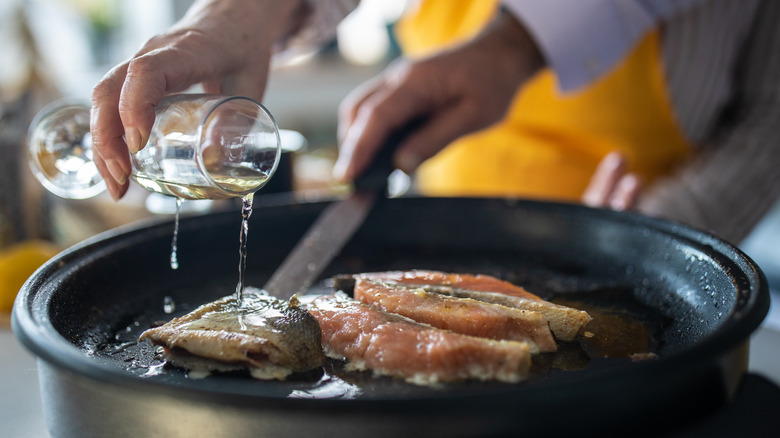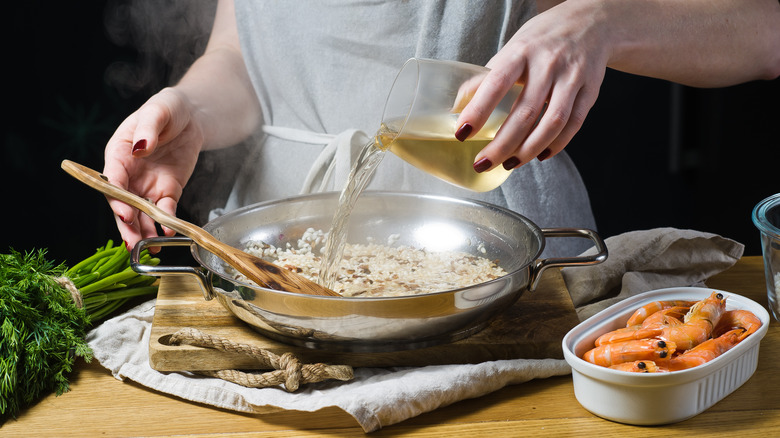What Makes Cooking Wine Different From The Stuff You'd Drink?
Whenever you're enjoying a delicious meal, you'll need a beverage to wash it down. One of the most desirable drinks to imbibe alongside your meal is wine. If you are choosing a bottle or two for your next dinner party, there are a slew of essential wine-pairing recommendations that you should heed. Whether your chosen bottle is red or white, and regardless of which grape goes into it, there is one particular type of wine that is fundamentally different from the other options.
Wine can either be for drinking or cooking. The distinction between these two types is primarily quality. Subsequently, cooking wine is cheaper than the higher-quality drinking options. However, before you snag a bottle of bargain bin vino to toss into your next meal, you should know that there is a prevalent notion that you should only cook with wine you would drink. Cooking wine has a higher alcohol content than other varieties, and it usually contains extra salt, sugar, and preservatives. While these additives can help the wine withstand the heat of cooking, they also detract from the wine's overall flavor profile.
The composition of cooking wine
While most bottles of wine wind up with an alcohol percentage between 11 and 13, cooking wine is often in the 16 to 17% range. This added alcohol serves a purpose, as a lot of alcohol will inevitably be cooked off when the wine is exposed to heat. Added alcohol aside, cooking wine is less pleasing on the palette because of the added sugar and salt, which will inevitably affect the wine's flavor and drinkability.
Cooking wine also contains preservatives, which extends the wine's lifespan considerably. This is ideal for those who seldom purchase wine and only need a small amount for occasional recipes, but will make it a less palatable product to drink. If you enjoy a good glass of wine, you can use a bottle that you already have on hand for the few splashes your dish calls for. It's suggested that you use a standard drinking wine up in a matter of days by either including it in another dinner or drinking it. If this wine is left unused too long, given its lack of preservatives, it will go bad.
Should you consume cooking wine?
Many cooks insist that wine is an ingredient you should never buy at the supermarket and instead pick up a nicer bottle at your local liquor store. Though the price of cooking wine cannot be beaten, you can still buy relatively cheap bottles that make a much better ingredient in your meal. Although cooking wine is safe to drink, its added preservatives and overly salty and sweet notes make it undesirable to sip straight out of the bottle.
If you are buying regular wine to use in the next meal you make, you should place limitations on yourself. The top shelf bottles should still be reserved for drinking. Even if your budget allows for some of these nicer wines, you should choose a cheaper bottle of whatever wine you're looking to use. Furthermore, you don't necessarily need to use wine when a cooking project calls for it. Different dishes utilize wine for different reasons. If wine brings savory flavors to the mix, you can substitute it with broth, and the acidity can be replaced by using vinegar or tomato juice. If you're looking for sweetness, there are plenty of fruit juices to cook with. Ultimately, though you can consume cooking wine, you'll need to test the bottle for yourself to see if it holds up to the taste of table wine.


